Can horses eat watermelon? Of course they can! Horses absolutely love watermelon. Being so juicy and sweet makes it a favourite food for horses. A huge advantage of feeding your horse watermelon is that the high water content makes it excellent for helping them cool down in the warm summer weather. You could also chill it in the refrigerator or even freeze it for greater benefit.
How to Feed Watermelon to Your Horse?
Rather than placing the entire watermelon in front of the horse, you need to prepare it. To make it manageable for your horse, you should chop it up into smaller pieces. First cut it into half and take the center and seeds out. Then cut it up into medium sized pieces, approximately the size of a banana or half an apple.
Can Horses Eat Watermelon Rind?
The rind or outer skin of the watermelon is also safe for the horse. Although some horses prefer just the fruit, others are equally happy to eat it with the rind. Experiment with both to find out what your horse prefers.
Some horses are even able to manage eating the watermelon without the rind even on their own. Check this with a quick experiment before you spend unnecessary time and effort in preparing the watermelon for your horse.
How About Watermelon Seeds?
Watermelon seeds are not good for horses; in fact they may even be harmful. A few seeds may not cause too much harm so you may ignore a few. However, seeds of some fruit (apples, cherries, peaches) in large quantities should be avoided. The reason is that when these seeds are digested, they release slight quantities of cyanide and this may cause harm to the horse’s health in the long term.
The bottom line is that horses love watermelon, and in small quantities, the seeds and rind are okay for your horse to eat.
Is the Sugar in Watermelon Harmful for the Horse?
This is perhaps one of the most worrying factors for horse owners. You may wonder about the sugar content of watermelon when feeding it to a horse. Although a watermelon tastes very sweet and seems to have a lot of sugar content, this isn’t actually true. Watermelon derives its name from the word water, and is mostly made of water. Approximately 90% of watermelon comprises water. This means that nearly 10% of watermelon is pulp and sugar, in addition to some minerals, i.e. phosphorus and magnesium, and vitamins, including vitamin A and vitamin C.
Does this amount of sugar make watermelon bad for a horse? Not really, because sugar is found naturally in most plant, fruits and vegetables. Carrots don’t taste very sweet and are often fed to horses in large quantities. You may be surprised to know that carrots contain nearly as much sugar content as watermelon. Horses eat pasture grass as a natural food. Grass contains sugar too! At specific times in the year, this can be substantially more than that found in watermelon.
During the course of the day, a horse consumes large amounts of sugar. If there is too much sugar content in the grass, the horse may suffer from colic or laminitis. Thus, you can see that eating watermelon is not likely to cause any health issue for your horse due to the sugar content.
Toxins in Watermelon
It is common knowledge that watermelon rind does contain toxin and this raises a concern among horse owners when they consider feeding their pet watermelon rind. Watermelon belongs to the cucumber family. No one thinks twice about eating an unpeeled cucumber or even giving it to a horse. Additionally, people can eat pickled watermelon rind. There are some toxins in cucumber peel, watermelon rind, but these are also present in the peels and seeds of most fruits. However, this quantity is very minimal and not likely to cause much problems.
One precaution you can take to avoid toxins is to wash your watermelon thoroughly before you slice it. The exterior of the watermelon or any other fruit is likely to be sprayed with herbicides or pesticides. They may also carry bacteria such as e.coli that can go into the flesh of the fruit when you cut in with a knife. This can be bad for you, but your horse may not be affected by the bacteria or residue as his size is so large.
Use Watermelon in Moderation
Like stated above, horses can be fed watermelon in moderation. Too large a quantity of watermelon would of course not be good for the horse. So don’t put a large heap of watermelons in the pasture because your horse may end up with colic. Additionally, large pieces of the fruit may cause your horse to choke, so it may be wiser to break up the rind into smaller pieces. Let your horse enjoy watermelon in the warm summers without any worries!
References:
http://horses.about.com/od/feedingyourhorse/fl/Feeding-Watermelon-To-Your-Horse.htm
http://myhorse.com/blogs/horse-care/feeding/raisins-watermelon-rind-whats-a-safe-treat-for-a-horse/
http://www.canhorseseat.com/watermelon/
http://www.petparents.com/show.aspx/horses/horse-health/common-foods-to-avoid-feeding-your-horse

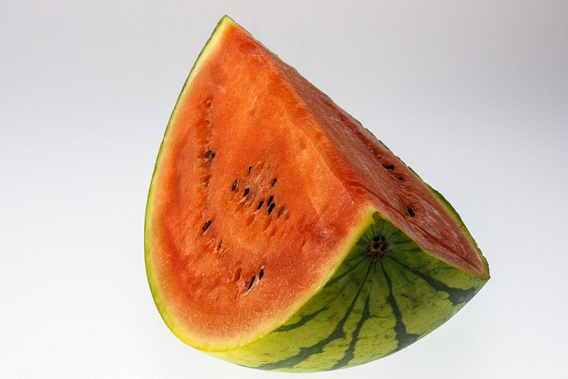
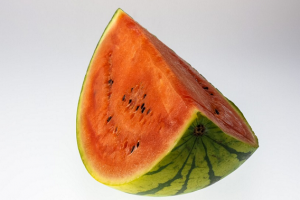
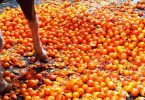
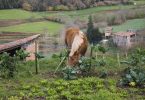

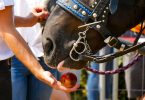

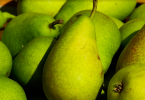
Leave a Comment